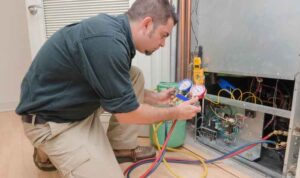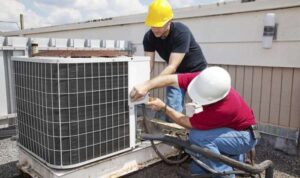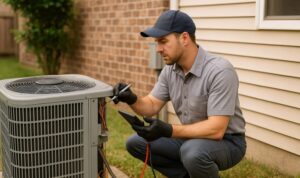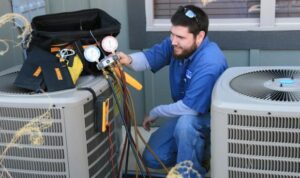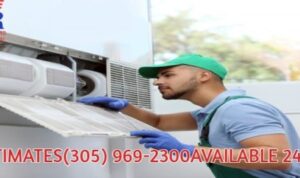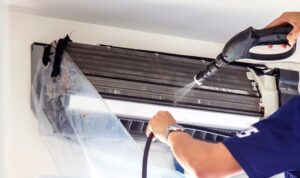Exploring the realm of common air conditioner problems and solutions unveils a wealth of insights and practical advice for both novice and experienced users alike. From identifying key issues to implementing effective fixes, this guide promises to be a valuable resource for optimizing your cooling system's performance.
Delving deeper into the nuances of air conditioner maintenance and troubleshooting, this guide aims to equip readers with the knowledge and tools necessary to address common issues efficiently.
Common Air Conditioner Problems
Air conditioners can encounter various issues that can affect their performance and efficiency. It is essential to be aware of these common problems to ensure timely repairs and maintenance.
1. Refrigerant Leaks
Refrigerant leaks are a common problem in air conditioners and can lead to reduced cooling capacity. Symptoms of a refrigerant leak include insufficient cooling, ice buildup on the evaporator coils, and hissing sounds from the unit.
- Ice buildup on evaporator coils
- Warm air blowing from vents
- Hissing or bubbling sounds
2. Dirty Air Filters
Dirty air filters can restrict airflow, reducing the efficiency of the air conditioner and increasing energy consumption. Symptoms of clogged air filters include reduced airflow, longer cooling times, and increased dust in the air.
- Reduced airflow from vents
- Longer cooling times
- Increased dust in the air
3. Electrical Issues
Electrical problems, such as faulty wiring or a malfunctioning thermostat, can disrupt the functioning of an air conditioner. Symptoms of electrical issues include frequent cycling on and off, inconsistent cooling, or complete unit failure.
- Frequent cycling on and off
- Inconsistent cooling
- Complete unit failure
4. Frozen Evaporator Coils
Frozen evaporator coils can prevent the air conditioner from effectively cooling the air. Common causes of frozen coils include restricted airflow, low refrigerant levels, or dirty coils. Symptoms include warm air blowing from vents, ice buildup on the coils, and reduced cooling capacity.
- Warm air blowing from vents
- Ice buildup on coils
- Reduced cooling capacity
Solutions for common air conditioner problems
When faced with common air conditioner problems, it's important to know how to troubleshoot and resolve these issues effectively. By following step-by-step solutions and implementing preventive measures, you can ensure your air conditioner operates smoothly.
Clogged Air Filters
A clogged air filter can restrict airflow and reduce the efficiency of your air conditioner. To solve this problem:
- Turn off the unit and locate the air filter.
- Remove the filter and clean or replace it, depending on the type.
- Regularly check and clean or replace the air filter every 1-3 months to prevent clogging.
Refrigerant Leaks
Low refrigerant levels can lead to poor cooling performance. To address refrigerant leaks:
- Consult a professional HVAC technician to identify and fix the leak.
- Ensure the refrigerant is refilled to the appropriate levels by the technician.
- Regularly schedule maintenance checks to detect and repair any leaks early on.
Frozen Evaporator Coils
Frozen evaporator coils can prevent your air conditioner from cooling properly. Here's how you can resolve this issue:
- Turn off the unit to allow the coils to thaw.
- Check for any airflow obstructions and remove them.
- Once thawed, restart the air conditioner and ensure proper airflow is maintained.
Thermostat Issues
Incorrect thermostat settings can cause temperature inconsistencies. To troubleshoot thermostat problems:
- Check the thermostat settings and ensure they are set correctly.
- Replace the batteries if the thermostat is battery-operated.
- Consider upgrading to a programmable thermostat for better control and energy efficiency.
Importance of Regular Maintenance
Regular maintenance is crucial for ensuring the optimal performance and longevity of your air conditioner. By following a comprehensive maintenance checklist and conducting routine inspections, you can prevent common problems and costly repairs down the line.
Maintenance Checklist
- Change or clean the air filters regularly to improve air quality and efficiency.
- Inspect and clean the evaporator and condenser coils to ensure proper heat transfer.
- Clear debris and obstructions from the outdoor unit to prevent airflow restrictions.
- Check and refill refrigerant levels to maintain cooling capacity.
- Inspect and clean the blower components for optimal airflow.
- Tighten electrical connections and lubricate moving parts to prevent system failure.
- Calibrate the thermostat for accurate temperature control.
Preventing Common Problems
Regular maintenance not only helps improve the efficiency of your air conditioner but also plays a vital role in preventing common problems such as:
- Reduced cooling capacity due to dirty filters or coils.
- Compressor failure caused by low refrigerant levels.
- Poor airflow resulting from clogged ducts or obstructions.
- Thermostat issues leading to inaccurate temperature readings.
- Electrical failures due to loose connections or worn-out components.
By staying proactive with maintenance tasks, you can extend the lifespan of your air conditioner and enjoy consistent comfort in your home.
DIY tips for air conditioner maintenance
Regular maintenance is essential to keep your air conditioner running efficiently. Here are some simple do-it-yourself tips that homeowners can follow to ensure their air conditioner stays in top condition and prolong its lifespan.
Cleaning Air Filters
One of the most important maintenance tasks is cleaning or replacing the air filters regularly. Clogged filters can restrict airflow, reducing the efficiency of your air conditioner and increasing energy consumption. It is recommended to clean or replace filters every 1-3 months, depending on usage.
- Turn off the power to the unit before removing the filter.
- Vacuum or wash reusable filters with soap and water. Allow them to dry completely before reinserting.
- If using disposable filters, replace them with the correct size and type recommended by the manufacturer.
Cleaning Coils and Fins
Dirty coils and fins can also affect the efficiency of your air conditioner. Cleaning them regularly can improve airflow and heat transfer.
- Use a coil cleaner to remove dirt and debris from the evaporator and condenser coils.
- Straighten any bent fins on the condenser unit with a fin comb to ensure proper airflow.
- Trim any vegetation around the outdoor unit to prevent debris buildup.
Checking Refrigerant Levels
Low refrigerant levels can indicate a leak in the system and can lead to poor cooling performance. It is best to consult a professional to check and recharge refrigerant levels if needed.
Regular Inspections
Inspect the unit for any signs of wear and tear, such as loose connections, leaks, or unusual noises. Addressing these issues early can prevent costly repairs down the line.
Benefits of DIY Maintenance
Performing regular maintenance on your air conditioner not only ensures optimal performance but also helps in prolonging its lifespan. By keeping your unit clean and well-maintained, you can save on energy costs, prevent breakdowns, and enjoy cool, comfortable air throughout the year.
Wrap-Up
In conclusion, the journey through common air conditioner problems and solutions has shed light on the importance of regular maintenance and proactive care. By staying informed and proactive, users can ensure their cooling systems operate smoothly and efficiently for years to come.
Questions and Answers
What should I do if my air conditioner is blowing warm air instead of cold air?
This could indicate a refrigerant leak or a problem with the compressor. It's best to contact a professional HVAC technician to diagnose and fix the issue.
How often should I change the air filters in my air conditioner?
Air filters should typically be replaced every 1-3 months, depending on usage and the type of filter. Regularly changing filters helps maintain good air quality and system efficiency.
Why is my air conditioner making strange noises?
Strange noises could be due to loose parts, a worn-out belt, or debris in the system. It's important to address these issues promptly to prevent further damage.

